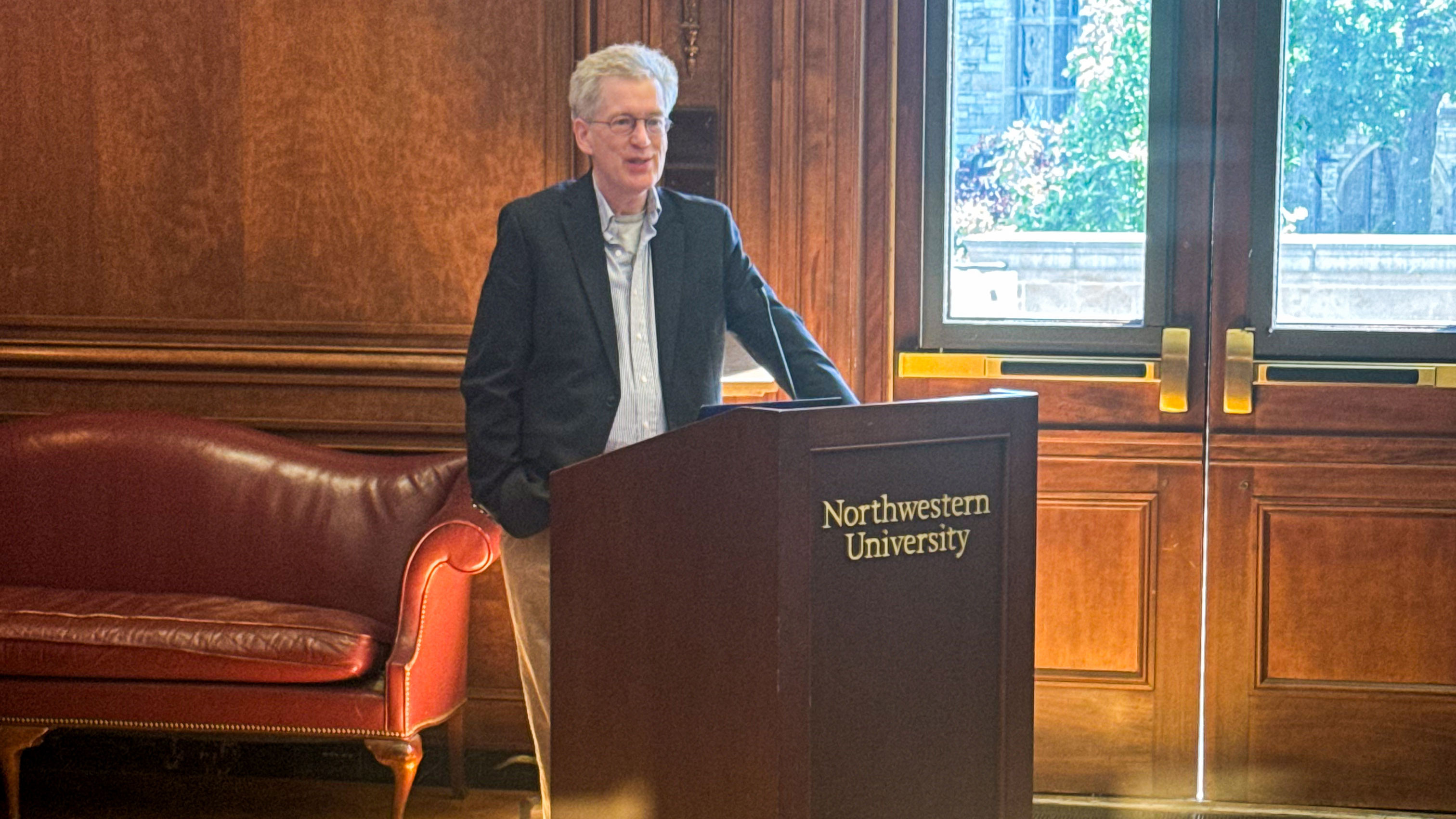A Message from the Chair
Over the last few years, there’s been a lot of talk about the deepening crisis in the humanities. It’s true that, across the country, humanities departments are struggling to fill their classes and sustain their majors. But here in Harris Hall, history is thriving.
We see it in our undergraduate courses, which this year drew our largest enrollments in a decade. We filled many of our longstanding classes, such as the perennially popular Global History sequence, while giving our students the opportunity to explore innovative new offerings, among them Sean Hanretta’s compelling course on the assassination of Patrice Lumumba, Michael Allen’s “American Wars,” and Lina Britto’s global history of cannabis. In Fall Quarter we also launched our first Sanders Seminar, under the direction of Robin Bates. Funded by an extraordinary gift from Ian Sanders, Class of ’91, the seminar led 15 outstanding students through a two-quarter examination of the historian’s craft, complete with personal appearances by some of the eminent scholars whose work the students read.

We also took our students beyond the classroom. This year a record 40 undergrads served as research assistants on faculty members’ current projects, through the Chabraja Center for Historical Studies’ Leopold Fellows program. The Chabraja Center set another record too: it provided 15 of our graduate students with summer fellowships that allowed them to intern with nonprofits ranging from the Frances Willard House – a block from Harris Hall – to Minneapolis’ Dakhóta Iápi Okhódakičhiye, which promotes Dakota language learning.
All of that activity builds on the department’s deep dedication to teaching. I tell anyone who’s willing to listen that History has won more teaching awards than any other unit in Weinberg College. We padded our lead just last week, when Keith Woodhouse won the College’s E. Leroy Hall Distinguished Teaching Award and John Branch won the College’s Outstanding Graduate Student Teaching Award.
Our scholarly work is thriving too. At the Chabraja Center’s annual new book party in March, we celebrated Yoni Brack’s An Afterlife of the Khan; Lina Britto’s two-volume Histories of Solitude; Laura Hein’s The Modern Japanese Nation and Empire; David Schoenbrun’s Beyond Ethnicity?; a new edition of Leslie Harris’ In the Shadow of Slavery; and three (!) edited volumes from Yohanan Petrovsky-Shtern: Miron Petrovsky and his Epoch, Jewish Photographers and Photo Studies in L’viv/Lwow/Lemberg, 1860-1939, and The Jewish Architectural Legacy of Lviv , 1550-1939. Our faculty and grad students have also been busy publishing in major journals and a range of public-facing venues, among them The Atlantic, The New York Times, The Washington Post, Dissent, and The New Yorker, which regularly features essays and reviews by Gerry Cadava and Daniel Immerwahr – and earlier this year ran a cartoon of Leslie Harris alongside a “Talk of the Town” story about her work on behalf of Manhattan’s Tenement House Museum.
Other forms of recognition have rolled in as well. Deborah Cohen’s Last Call at the Hotel Imperial won Phi Beta Kappa’s Ralph Waldo Emerson Award. Daniel Immerwahr won the Organization of American Historians’ Brinkley-Stephens Award for the best article published this year in The Journal of American History. Paul Ramírez will be spending next year as a fellow of the Stanford Humanities Center, Lauren Stokes as a fellow at the Hamburg Institute for Advanced Study, and Michaela Kleber as a Fulbright Scholar in France, while Ed Muir will be getting a well-deserved breather, having completed his demanding term as president of the American Historical Association, the highest honor our discipline bestows.
Last fall, we welcomed three new colleagues into our ranks. Haley Bowen, a specialist in Early Modern Europe, joined us from the University of Michigan, where she completed her dissertation in the summer of 2023. She’s now at work on her book manuscript, “Breaching the Cloister: Laywomen, Convents, and the State in the Early Modern French Empire.” Jonathan Brack came to us from the faculty of Ben-Gurion University. An historian of the Early Middle East, Yoni published his first book, An Afterlife for the Khan: Muslims, Buddhists, and Sacred Kingship in Mongol Iran and Eurasia, just a few weeks before his arrival in Evanston. Akin Ogundiran, a distinguished scholar of Early African history, was Chancellor’s Professor at the University of North Carolina-Greensboro before coming to us as Cardiss Collins Professor of Arts and Sciences. He brings with him an imposing record of important publications, stretching from his early articles to his recent prize-winning book, The Yoruba: A New History.
I’m also very pleased to announce our newest hire. Zavier Nunn received his Ph.D. in Modern European history from the University of Oxford in 2023. A specialist in German Trans history, Zavier is spending next year as a member of Columbia University’s Society of Fellows, then joining us in September 2025. At Northwestern, he’ll hold a joint appointment in History and Gender and Sexuality Studies.
As we reach the end of the year, we’ll be celebrating the remarkable careers of our beloved colleagues Sarah Maza and David Schoenbrun, who’ll be retiring at summer’s end. Sarah and David have given the department a combined 71 years of service as brilliant teachers, mentors, and field-defining scholars. It’s been a great honor to work alongside such masters of their craft.
Finally, enormous thanks to the superb staff members – Christina Alexandru, Nick Anton, Susan Delrahim, Julie Hoather, and Annerys Cano, our amazing business manager – who keep the department going with skill, grace, and good humor. And to you, our alumni, for your generous support of our work. We are so grateful. Please keep in touch: we love hearing your news and proudly displaying your books in our recently upgraded seminar room. If you’re ever on campus, come over to Harris Hall. It’s an exciting place to be.
Sincerely,

Kevin Boyle
